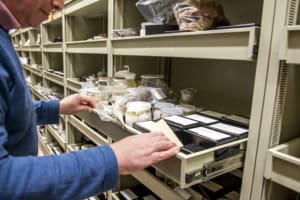People and Plants: Reactivating Ethnobotanical Collections As Material Archives of Indigenous Ecological Knowledge

This AHRC-funded, one-year project was led by the National Museums Scotland, Royal Botanic Gardens, Kew and the Powell-Cotton Museum.
It investigated the relationship between natural history and ethnographic collections, building on a renewed interest in indigenous ecology and the significance of ethnobotanical collections as repositories of indigenous ecological knowledge.
Situating itself within contemporary discussions on decolonising museum practices and methodologies, the project aimed to foster dialogue among academics, researchers, museum professionals, botanists, and indigenous knowledge holders. This conversation sought to highlight the relevance of ethnographic and ethnobotanical collections in the present, and their potential applications for the future.
Project Aims
- To bring academics and curators together with artists and knowledge holders from specific originating/diasporic communities in Australia, Somalia and Brazil, to create a strong network and to explore the ways in which stakeholders engage with and care about the material archives of bio-cultural collections.
- To consider in what ways historic collections of ethnobotany contain, represent and preserve indigenous ecological knowledge.
- To generate a better understanding of how such collections can be rendered versatile, as research and knowledge resources for indigenous and non-indigenous stakeholders to address current cultural and environmental concerns.
- To explore the ongoing significance of ethnobotanical collections and the implications this has for the ways in which these collections are catalogued, made accessible, cared for and displayed.
Workshops
Three one-day workshops were held during 2022 at each participating institution. These workshops invited student researchers, museum researchers, community members, ecologists, and academics, as well as museum staff affiliated with MEG and/or the Natural Sciences Collections Association (NATSCA).
Somalia
Powell-Cotton Museum, March 2022
This workshop was conducted in collaboration with the School of Anthropology and Conservation at the University of Kent and the NOMAD project, which works with engaging Somali communities in heritage projects. The discussions considered the salience of ethnobotanical specimens for diasporic communities (particularly women) and how these narratives can be embedded into museum processes such as cataloguing, display and outreach. The workshop used the Diana Powell-Cotton collection (1934-35) from Somalia as a case study, which includes a distinct subset of medicines related to women’s and children’s health.
Programme:
- 9:30 – 10:00 – Welcome and housekeeping
- 10:00 – 10:15 – Introduction to People and Plants
- 10:15 – 11:30 – Introduction to the Powell-Cotton Museum and time to explore the Museum
- 11:30 – 13:00 – Short papers from Abira Hussein (NOMAD project/University College London) on ‘The potential role digital technologies can have in pluralising curation, and the role of diaspora knowledge in challenging and informing museum practice’; Rosa Dyer (Pitt Rivers Museum/Birkbeck College) on ‘Initial explorations of the Somali ethnobotanical collection at the Powell-Cotton Museum’; and Inbal Livne (Powell-Cotton Museum) on ‘Community engagement and decolonising the catalogue’.
- 13:00 – 14:00 – Lunch
- 14:00 – 16:00 – Discussion in the collections: How can these collections be useful beyond the museum?
- 16:00 – 16:30 – Wrap up and next steps
- 18:00 – Dinner, Margate.
The workshop talks are available through the project’s Youtube channel.
Transnational and Global
Online Workshop, July 2022
While the in-person session at the Powell-Cotton Museum focussed on collections particular to it, the online workshop offered an opportunity to discuss across geographies and institutions, reflecting on the interconnectedness of ecologies and the relationships between people and plants in Australia, Canada, and the African continent.
Australia
National Museums Scotland Collections Centre, November 2022
This workshop focused on Australia, using the collections brought together by Dr Emile Clement (1895-1900) as a case study. It explored the potential of ethnobotanical collections to serve as resources for Indigenous communities in cultural revitalisation projects, education, and artistic practice.
Programme:
- 09:45 – 10:00 – Welcome and housekeeping
- 10:00 – 10:15 – Introduction to People and Plants
- 10:15 – 11:00 – Introduction to National Museums Scotland and store tours
- 11:00 – 13:00 – Short papers from Gerry Turpin (Australian Tropical Herbarium), Ali Clark (National Museums Scotland), Alistair Paterson (University of Western Australia) and the Ngarluma Yindjibarndi Foundation.
- 13:00 – 14:00 – Lunch
- 14:00 – 16:00 – Discussion in the collections.
- 16:00 – 16:30 – Wrap up and next steps
- 18:00 – Dinner, Newhaven, Edinburgh.
Brazil
Royal Botanic Gardens, Kew, November 2022
This workshop was conducted in collaboration with the Department of Cultures and Languages, Birkbeck, University of London and Museu Goeldi in Brazil. Discussions focussed on the ecological value of ethnobotanical collections, emphasising the interaction between Western botanical nomenclature and traditional knowledge. The Richard Spruce collection (1849-1864) served as a case study, examining how culture, plants, and the environment in the northwest Amazon have changed over the last 160 years.
Project Team
The project was led by Dr Ali Clark (National Museums Scotland) and Professor Mark Nesbitt (Royal Botanic Gardens, Kew) with the Powell-Cotton Museum as a project partner alongside MEG and the Natural Sciences Collections Association.
The project was supported by an advisory group including Dr Rajindra Puri (University of Kent) Professor Luciana Martins (Birkbeck) Dr Jilda Andrews (Australian National University) Isla Gladstone (Bristol Museum and Art Gallery) and Dr Johanna Zetterstrom-Sharp (Horniman Museum and Gardens).
Read Kathleen Lawther and Nicola Frogatt’s reflections on the workshop.